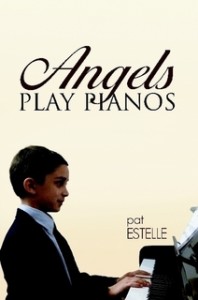★★★½
Angels Play Pianos by Pat Estelle tells the story of Jimmy, a child prodigy who is able to play Beethoven flawlessly at the age of five. Tragically, the book begins with his death, but the novel tells the tale of hope among the hardship of a troubled family.
The prose in Angels Play Pianos has a quiet grace – especially when describing the abusive father and husband, Edward. He’s truly infuriating and frustrating, but Estelle’s reserve in describing him manages to make him seem more menacing. There’s no anger or vitriol thrown his way; it’s a subtle take-down of his worst habits. In a novel that centers around the psychic boy, Jimmy, his father, Edward, might be the most electric character.
Jimmy is a lively and engaging character, and there’s something refreshing about treating a psychic child as completely normal – as if he’s merely precocious:
A few months into her second pregnancy, Elizabeth was astonished one day by what Jimmy said; it was evidence of his extraordinary ability to see things in the future, even at that early age. She’d heard stories about people who were called psychics or mediums, people who could see things before they happened, and those who could communicate with the dead, but she wasn’t sure if she believed those things. Surely Jimmy wasn’t a psychic, was he? But after what happened, she had little doubt that he possessed some kind of power outside the normal senses.
The way Jimmy’s abilities are woven into this small town tale is inventive in a way. Psychic ability is a high concept idea, but the book treats it as yet another talent. Estelle’s take on the subject is innovative. However, the story is understated to a fault. Too often, the understated prose veers into being dry. The parts describing Jimmy’s ability are the most fun, but they’re few and far between for much of the book.
Instead of focusing on Jimmy, there is a lot of description of the daily life of his mother, Elizabeth. It reads a bit like a memoir where someone is going over all the small details of their life, which may seem momentous to the writer, but to the reader just seem like everyday issues. So while it’s refreshing that Jimmy is treated like just another kid, his abilities and artistic talent aren’t given nearly enough attention in the novel.
Really, this is Elizabeth’s novel, not Jimmy’s, as if it was a short story about Jimmy’s abilities stretched into a novel, but only expanding the detail of Elizabeth’s life. As Jimmy is meant to be the focal point of the book, there is not nearly enough conflict around his abilities. Elizabeth is very proud of his abilities as a piano player, but beyond that, there’s not much else to propel the story along, such as the alienation of being a gifted kid, or maybe being tormented by psychic visions. The story didn’t necessarily have to get dark, but the bulk of Jimmy’s story is so nice as to be weightless. Therefore in terms of story and character arc, there is far too much mundane detail, and not enough excitement, to make the book truly gripping.
All that said, there is something also soothing about the novel, given that it doesn’t have too many highs or too many lows. Estelle is an accomplished writer. Sentence by sentence, the novel is well-formed and highly readable.
Review Overview
Design
Editing
Content
Get an Editorial Review | Get Amazon Sales & Reviews | Get Edited | Get Beta Readers | Enter the SPR Book Awards | Other Marketing Services
























Leave A Comment